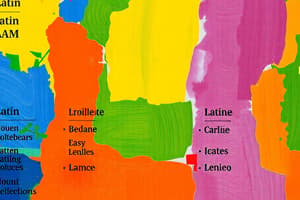Podcast
Questions and Answers
The genitive singular form is always presented with its gender and definition.
The genitive singular form is always presented with its gender and definition.
True (A)
In the nominative and accusative cases, neuter nouns have distinct forms.
In the nominative and accusative cases, neuter nouns have distinct forms.
False (B)
The nominative plural form of neuter nouns ends in -a.
The nominative plural form of neuter nouns ends in -a.
True (A)
The 1st declension noun 'puella' has 'puellam' as its accusative singular form.
The 1st declension noun 'puella' has 'puellam' as its accusative singular form.
The genitive plural of 2nd declension masculine nouns ends in -arum.
The genitive plural of 2nd declension masculine nouns ends in -arum.
The noun 'officium' is a neuter noun from the 2nd declension.
The noun 'officium' is a neuter noun from the 2nd declension.
The genitive singular form of 'urbs' is 'urbia'.
The genitive singular form of 'urbs' is 'urbia'.
Declensions categorize nouns based on their grammatical behavior and form.
Declensions categorize nouns based on their grammatical behavior and form.
The genitive plural form of 'animal' is 'animālibus'.
The genitive plural form of 'animal' is 'animālibus'.
Nouns with a nominative ending in -ēs also have genitive ending in -is.
Nouns with a nominative ending in -ēs also have genitive ending in -is.
The nominative singular form of 'fire' is 'ignem'.
The nominative singular form of 'fire' is 'ignem'.
The ablative singular form of 'labor' is 'labore'.
The ablative singular form of 'labor' is 'labore'.
The accusative singular of 'animal' can be either 'animālia' or 'animal'.
The accusative singular of 'animal' can be either 'animālia' or 'animal'.
The genitive plural form of 'fire' is 'ignium'.
The genitive plural form of 'fire' is 'ignium'.
Nouns in the 3rd declension with an ablative singular in -ī are exclusively neuter nouns.
Nouns in the 3rd declension with an ablative singular in -ī are exclusively neuter nouns.
The accusative plural form of 'litus' is 'litores'.
The accusative plural form of 'litus' is 'litores'.
Flashcards
Noun declensions
Noun declensions
Groups of nouns that are inflected (changed their form) in the same way.
Nominative case
Nominative case
The basic form of a noun, typically used as the subject of a verb.
Genitive case
Genitive case
Shows possession or relationship.
3rd declension nouns
3rd declension nouns
Signup and view all the flashcards
Neuter nouns (plural)
Neuter nouns (plural)
Signup and view all the flashcards
1st declension nouns (singular)
1st declension nouns (singular)
Signup and view all the flashcards
2nd declension masculine plural (Nominative)
2nd declension masculine plural (Nominative)
Signup and view all the flashcards
Stem
Stem
Signup and view all the flashcards
i-stem nouns
i-stem nouns
Signup and view all the flashcards
3rd declension i-stems with ablative singular in -ī
3rd declension i-stems with ablative singular in -ī
Signup and view all the flashcards
3rd declension i-stems with ablative singular in -e
3rd declension i-stems with ablative singular in -e
Signup and view all the flashcards
Irregular genitive plurals
Irregular genitive plurals
Signup and view all the flashcards
What's special about the genitive plural of 'canis', 'iuvenis', 'mare', 'vātēs'?
What's special about the genitive plural of 'canis', 'iuvenis', 'mare', 'vātēs'?
Signup and view all the flashcards
What type of nouns are 'manus', 'cornū', 'rēs'?
What type of nouns are 'manus', 'cornū', 'rēs'?
Signup and view all the flashcards
Study Notes
Noun Reference Sheet
- Nouns are defined by their nominative and genitive singular forms, gender, and meaning
- For regular nouns, the genitive is often simply the ending
- Third declension nouns may have unusual nominatives; use the stem formed by removing -is from the genitive
- Examples: puella (girl), urbs (city), ludus (school), animal (animal), officium (duty)
- Declension groups indicate how nouns change in different grammatical cases
- Neuter noun nominative and accusatives are identical
- Neuter plural nouns have -a endings for nominative and accusative
- Nouns are declined consistently within their declension group
1st Declension
- Singular: nominative puella (-a), genitive puellae (-ae), dative puellae (-ae), accusative puellam (-am), ablative puellā (-ā)
- Plural: nominative puellae (-ae), genitive puellārum (-ārum), dative puellis (-īs), accusative puellās (-ās), ablative puellis (-īs)
2nd Declension
- Singular: nominative ludus (-us), genitive ludī (-ī), dative ludō (-ō), accusative ludum (-um), ablative ludō (-ō)
- Plural: nominative ludī (-ī), genitive ludōrum (-ōrum), dative ludīs (-īs), accusative ludōs (-ōs), ablative ludīs (-īs)
3rd Declension M/F I-stem
- Singular: nominative labor (-ō), genitive laboris (-is), dative laborī (-ī), accusative laborem (-em), ablative laborē (-e)
- Plural: nominative laborēs (-ēs), genitive laborum (-um), dative, accusative and ablative laboribus (-ibus)
- Example: ignis (-is)
3rd Declension I-Stem (Neuter)
- Singular: nominative litus (-us), genitive litoris, dative litori, accusative litus, ablative litore (-e)
- Plural: nominative litora (-a), genitive litorum (-um), dative, accusative and ablative litoribus (-ibus)
3rd Declension N.
- Singular: nominative animal (-us), genitive animālis (-is), dative animālī (-ī), accusative animal, ablative animālī (-ī)
3rd Declension (N. i-Stem)
- Plural: nominative animālia (-ia), genitive animālium (-ium), dative, accusative and ablative animālibus (-ibus)
4th Declension
- This is a separate, specialized declension
- Singular and plural variations given for masculine/feminine and neuter forms
- Examples of 4th declension nouns: manus (hand), cornū (horn), rēs (thing)
Additional Notes (General)
- I-stem nouns often have ablative singular in -ī
- Neuter nouns in -e, -al, -ar (e.g., mare, animal, calcar) can be irregular
- Nouns with nominative in -ēs and genitive in -is (e.g., nubēs, nubis) also have irregularities
- Some genitive plurals are in -um rather than the more common -ium
Studying That Suits You
Use AI to generate personalized quizzes and flashcards to suit your learning preferences.




